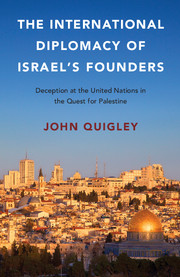 The International Diplomacy of Israel's Founders
The International Diplomacy of Israel's Founders Published online by Cambridge University Press: 05 January 2016
Abba Eban, freshly arrived in New York, took over from Gideon Rafael to make Israel's case. “I have just come from Jerusalem,” Eban announced, thanking the chair for recognizing him to speak, “to tell the Security Council that Israel, by its independent effort and sacrifice, has passed from serious danger to successful resistance.” Like Rafael, Eban claimed that Egypt started the war. Eban recounted the events of the previous weeks that reflected the tension between Egypt and Israel. He put the onus on Egypt for those events and said that Israel had tried to calm matters through diplomatic channels. Eban related Egypt's request to the United Nations to remove the UN Emergency Force. He related the restrictions that Egypt had imposed on Israel's shipping through the Straits of Tiran. He related Egypt's drawing of troops up to the armistice line. “These acts taken together – the blockade, the dismissal of the United Nations Emergency Force, and the heavy concentration in Sinai – effectively disrupted the status quo which had ensured a relative stability on the Egyptian-Israel frontier for ten years.”
Eban thus characterized these three acts of Egypt not as aggression but as a change in the status quo. He cited them as prelude and context for the acts he would charge against Egypt as aggression. “As time went on,” Eban continued, “there was no doubt that our margin of general security was becoming smaller and smaller. Thus, on the morning of 5 June, when Egyptian forces engaged us by air and land, bombarding the villages of Kissufim, Nahal-Oz and Ein Hashelosha we knew that our limit of safety had been reached, and perhaps passed. In accordance with its inherent right of self-defense as formulated in Article 51 of the United Nations Charter. Israel responded defensively in full strength. Never in the history of nations has armed force been used in a more righteous or compelling cause.” Eban claimed as well that Egypt had fighter jets in the air, on their way to Israel. “When the approaching Egyptian aircraft appeared on our radar screens, soon to be followed by artillery attacks on our villages near the Gaza Strip, I instructed Mr. Rafael to inform the Security Council, in accordance with the provisions of Article 51 of the Charter.”
Eban did not show physical evidence for any of his claims, nor did he promise physical evidence that he would show later.
To save this book to your Kindle, first ensure no-reply@cambridge.org is added to your Approved Personal Document E-mail List under your Personal Document Settings on the Manage Your Content and Devices page of your Amazon account. Then enter the ‘name’ part of your Kindle email address below. Find out more about saving to your Kindle.
Note you can select to save to either the @free.kindle.com or @kindle.com variations. ‘@free.kindle.com’ emails are free but can only be saved to your device when it is connected to wi-fi. ‘@kindle.com’ emails can be delivered even when you are not connected to wi-fi, but note that service fees apply.
Find out more about the Kindle Personal Document Service.
To save content items to your account, please confirm that you agree to abide by our usage policies. If this is the first time you use this feature, you will be asked to authorise Cambridge Core to connect with your account. Find out more about saving content to Dropbox.
To save content items to your account, please confirm that you agree to abide by our usage policies. If this is the first time you use this feature, you will be asked to authorise Cambridge Core to connect with your account. Find out more about saving content to Google Drive.